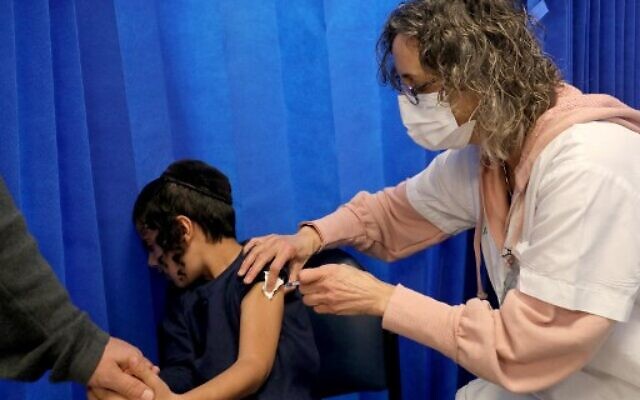Israeli children who were vaccinated against the coronavirus are catching the Omicron variant at less than half the rate of their unvaccinated peers, according to new research released late Wednesday.
The study, thought to be the first-of-its kind, is a rare bright spot for Israel as it contends with a massive wave of infections sweeping across the country. As of Wednesday evening, nearly 400,000 Israelis had active COVID infections, representing over 4 percent of the entire population, with 60,000 to 70,000 new cases being added daily.
The research looked into children aged 5-11, a group that became eligible for vaccines in late November, and found that the vaccines offered strong protection against coronavirus variants, especially in the first few months after being administered.
“Even during the Omicron wave, a vaccine given in the last three months — whether two doses or a booster dose — provides improved protection against infection compared to the unvaccinated or those whose vaccines are out of date,” the Health Ministry said in a statement.
The Health Ministry-led study found that between December 25 and January 16, just over 260 out of every 100,000 unvaccinated children in this age bracket got infected per day on average. Among those with vaccines, the figure was just above 120.
Teenagers who received booster doses were also shown to have heightened protection.
Israel made boosters available in late December for teens who had gotten their first two doses at least three months prior.

Data on Omicron infections among children, from the Israeli Health Ministry, with added English explanations (Israeli Health Ministry)
Those with boosters were infected at a rate of about 90 cases per 100,000, while the unvaccinated were infected at a rate of 330 infections per 100,000.
The study period coincided with a three-week stretch that saw COVID rates erupt from a moving average of nearly 1,300 new cases a day to over 45,000 daily infections, mostly fueled by Omicron, which has shown to spread with devastating speed, even among many of the fully vaccinated.
The data, which has not been peer reviewed, will likely reassure officials amid concerns over the Omicron variant’s apparent ability to break through vaccine defenses. According to the data, the vaccines work best holding Omicron at bay soon after they are administered. But those defenses appear to speedily fall apart after the first couple months.
According to the study, teens who got their first two doses three to four months earlier contracted COVID at a rate of 220 cases per 100,000 people. Those who got vaccinated five months or more earlier were only slightly better protected than the unvaccinated, getting infected at a rate of around 290 per 100,000.

Data on Omicron infections among children, from the Israeli Health Ministry, with added English explanations (Israeli Health Ministry)
The small margin in infection rates between the vaccinated and unvaccinated among teens is in stark contrast to the earlier Delta wave of the virus, during which those who had gotten immunized were seemingly better protected. A study released in September showed vaccinated teens 12-18 were 90% less likely than their unvaccinated cohorts to get sick a week after the second dose.
Vaccines only became available in late December for those 11 and under, meaning no comparison of performance against Delta and Omicron was possible.
The study was conducted by the Health Ministry in collaboration with scientists from the Weizmann Institute of Science, the Technion-Israel Institute of Technology, the Hebrew University and the Gartner Institute at Sheba Medical Center.

An Israeli health worker administers a dose of the Pfizer-BioNTech COVID-19 vaccine to a child at the Clalit Health Services in the central Israeli city of Modiin on January 2, 2022. (Photo by GIL COHEN-MAGEN / AFP)
Despite the positive data, hospitalizations among youths have doubled from 52 patients to 104 patients in recent days, according to a Wednesday report by the Kan public broadcaster.
The report did not attribute the data to a source or define what age group it included as youths. The Health Ministry could not be immediately contacted to verify the figures.
According to official ministry data released Wednesday, some 2 percent of all patients in serious or critical condition were 4 years old or younger, up from an average of 1% in the days prior. While those in the 5-11 group remained at 0%, according to the data, those 12-15 were up from 0% to 1%.

A COVID patient at the Hadassah Ein Kerem Hospital coronavirus ward receives a call from a family member, December 27, 2021. (Olivier Fitoussi/Flash90)
The figures showed that over 53,000 of the over 388,000 current active infections are among those 5-11, though over 47,000 of them are unvaccinated. Another approximately 34,000 active infections come from the 12-15 age group, though among that cohort, the vaccinated are in the majority, with nearly 20,000 of the cases.
Data late Wednesday showed 1,548 patients hospitalized with the coronavirus, the majority of them dealing with relatively minor infections and 540 people listed in serious condition. Data showed that over half of the serious patients were vaccinated, while another approximately 175 had never been vaccinated and the remaining patients had been vaccinated over six months earlier.
You’re serious. We appreciate that!
We’re really pleased that you’ve read X Times of Israel articles in the past month.
That’s why we come to work every day – to provide discerning readers like you with must-read coverage of Israel and the Jewish world.
So now we have a request. Unlike other news outlets, we haven’t put up a paywall. But as the journalism we do is costly, we invite readers for whom The Times of Israel has become important to help support our work by joining The Times of Israel Community.
For as little as $6 a month you can help support our quality journalism while enjoying The Times of Israel AD-FREE, as well as accessing exclusive content available only to Times of Israel Community members.